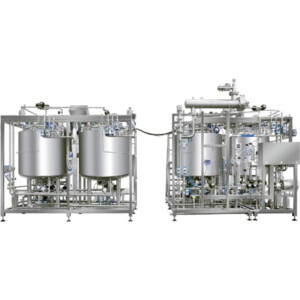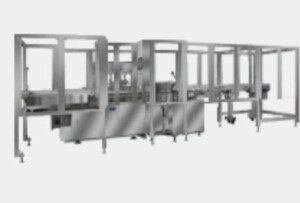In the realm of peptide synthesis, the choice between a Small Scale Peptide Production Line and Automated Peptide Synthesis Equipment is pivotal for researchers and manufacturers alike. Each option offers distinct advantages and challenges, which can significantly impact the efficiency, cost, and quality of peptide production. Understanding these differences is crucial for making an informed decision that aligns with specific production needs and goals.
Small Scale Peptide Production Lines are often favored by laboratories and small biotech companies due to their flexibility and cost-effectiveness. These systems allow for the customization of peptide sequences and the ability to produce small batches, which is ideal for research and development projects. The manual nature of these lines provides a level of control that is often necessary for precise scientific inquiry. However, this method can be time-consuming and labor-intensive, requiring skilled technicians to oversee the process.

On the other hand, Automated Peptide Synthesis Equipment offers a high-throughput solution suitable for larger scale operations. These machines are designed to synthesize peptides rapidly and with minimal human intervention, making them ideal for commercial production environments. The automation reduces the likelihood of human error and increases reproducibility, ensuring consistent product quality. Despite the higher initial investment, the long-term benefits of efficiency and scalability often justify the cost for many organizations.
One of the main considerations when choosing between these two options is the scale of production. Small Scale Peptide Production Lines are typically used for batches ranging from a few milligrams to several grams, making them suitable for early-stage research or pilot studies. In contrast, Automated Peptide Synthesis Equipment can handle much larger volumes, often in the range of hundreds of grams to kilograms, catering to the demands of full-scale manufacturing.
Another factor to consider is the complexity of the peptide sequences being synthesized. Small Scale Peptide Production Lines offer the flexibility to adjust synthesis parameters on-the-fly, which is advantageous for complex or novel peptides that may require unique conditions. Automated systems, while less flexible, are optimized for standard protocols and can efficiently produce peptides with established sequences.
Cost is another critical factor in the decision-making process. While Small Scale Peptide Production Lines generally have lower upfront costs, the ongoing expenses related to labor and time can add up. Conversely, Automated Peptide Synthesis Equipment requires a significant initial investment, but the reduction in labor costs and increased production speed can lead to cost savings over time.
The choice between these two systems also depends on the available infrastructure and expertise. Small Scale Peptide Production Lines may be more accessible to smaller labs with limited resources, whereas larger facilities with specialized staff may benefit more from the capabilities of automated equipment.
In terms of quality control, Small Scale Peptide Production Lines allow for more frequent monitoring and adjustments during the synthesis process, which can be beneficial for ensuring high-quality outcomes in complex projects. Automated systems, however, incorporate advanced technologies such as real-time monitoring and feedback loops, which maintain quality standards across large batches with minimal intervention.
Environmental considerations are also relevant when choosing a peptide production method. Automated Peptide Synthesis Equipment is generally more efficient in terms of resource usage, reducing waste and energy consumption. Small Scale Peptide Production Lines, while less efficient, offer the potential for more sustainable practices through careful management of reagents and materials.

The decision may also be influenced by the intended application of the peptides. For instance, pharmaceutical companies engaged in drug development may prioritize the high throughput and consistency of automated systems, while academic institutions may value the flexibility and customization offered by small scale lines for exploratory research.
In conclusion, the decision between a Small Scale Peptide Production Line and Automated Peptide Synthesis Equipment involves a careful evaluation of production needs, budget, and long-term goals. Both systems have their place in the peptide synthesis landscape, and the best choice depends on the specific requirements of the user.
Ultimately, the integration of either system can enhance the capabilities of a laboratory or manufacturing facility, contributing to advancements in peptide research and application. As technology continues to evolve, the lines between these two systems may blur, offering hybrid solutions that combine the best features of both.
When considering the future of peptide synthesis, it’s important to stay informed about technological advancements and industry trends. This knowledge will ensure that the chosen method remains relevant and competitive in a rapidly changing field.
It’s also worth noting that the choice of equipment can impact the overall workflow and efficiency of a laboratory. Proper training and maintenance are essential for maximizing the benefits of either system, ensuring that they operate at peak performance.
The adaptability of Small Scale Peptide Production Lines makes them a valuable tool for innovation and discovery, allowing researchers to experiment with new ideas and approaches. Automated systems, meanwhile, provide the backbone for large-scale production, supporting the commercialization of peptide-based products.
Both systems can coexist within the same organization, serving different purposes and complementing each other. This dual approach can maximize the potential of peptide synthesis, leveraging the strengths of each method to achieve diverse objectives.
As the demand for peptides continues to grow across various industries, the importance of choosing the right synthesis method becomes even more pronounced. Whether for pharmaceuticals, biotechnology, or academic research, the right equipment can drive success and innovation.
In summary, the debate between Small Scale Peptide Production Line vs. Automated Peptide Synthesis Equipment is not about which is better, but rather which is more suited to specific needs and contexts. Each system offers unique advantages that can be harnessed to achieve different goals.
By carefully considering factors such as production scale, cost, quality, and application, stakeholders can make informed decisions that align with their strategic priorities. This thoughtful approach ensures that the synthesis process supports broader organizational objectives.
In the end, the choice of peptide synthesis equipment is a strategic decision that requires a comprehensive understanding of both the technical and operational aspects of the production process.
As the field of peptide synthesis continues to evolve, staying informed and adaptable will be key to leveraging new opportunities and overcoming challenges. Whether using small scale or automated systems, the ultimate goal is to produce high-quality peptides that meet the needs of the market.
Thus, the ongoing evaluation and optimization of peptide synthesis methods are essential for maintaining a competitive edge and driving progress in this dynamic and rapidly advancing field.
PeptideGurus is a leading supplier of American-made research peptides, offering top-quality products at competitive prices. With a focus on excellence and customer service, they ensure a secure and convenient ordering process with global shipping.
CONTACT